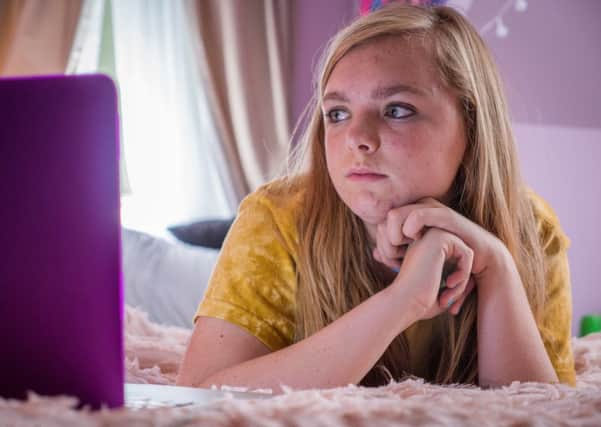Film reviews: Eighth Grade | The World is Yours | Pond Life | Bel Canto | Styx


Eighth Grade (15) ****
The World is Yours (15) ***
Pond Life (15) **
Bel Canto (15) **
Styx (12A) ****
With his debut feature Eighth Grade, American stand-up-turned-filmmaker Bo Burnham has crafted a sweet, funny, wonderfully nuanced coming-of-age film that modifies the daily trauma of being 13 for a digital age that demands at least the pretence of a perfectly realised life. Attempting to take that additional pressure in her stride is Kayla (Elsie Fisher), who wrestles with her status as the (newly crowned) quiet girl in her graduating class by producing her own perky YouTube advice show. That her vlogs and elaborately staged Instagram posts hardly rack up any views only makes her more endearing as a protagonist, subtly exposing what an inadequate bandage social media is for coping with the open wound of adolescence.
The film sees Kayla negotiate an array of familiar teen movie hurdles ranging from the innocuous to the potentially scarring, but it’s all pitched at the same intense level to reflect how weird and funny and scary growing up can be. Burnham never condescends to his young characters, nor does he take the easy option of turning Kayla’s dad – the one adult character of any note – into a clueless doofus for easy comic relief. Indeed, all of the comedy emerges organically, frequently aided by the juxtaposition of Burnham’s more expressionistic flights of fancy (including his use of Anna Meredith’s score) with his cast’s authentically raw and awkward performances, especially that of the excellent Fisher.
Advertisement
Hide AdA breakout performance by young Scottish actress Gabby Rose is one of the unexpected high points of The World is Yours, a French crime caper about a meek drug dealer (Karim Leklou) whose plan to go straight is derailed by his own monstrous mother (screen legend Isabelle Adjani). Rose plays the unimpressed daughter of a thuggish Glaswegian criminal who gets caught up in a convoluted scheme to extort her dad (an amusing Sam Spruel) while on holiday in Spain and finds herself kidnapped – albeit not necessarily unwillingly – by Adjani’s scheming matriarch and her dimwit conspiracy theory henchman (Vincent Cassel).
As unfazed as her character, Rose is hilariously droll when pitted against Adjani and it’s a bit of a shame she’s ultimately only a small part of a such a sprawling cast. That said, having conceived the film as something of an inverted tongue-in-cheek riff on Brian De Palma’s Scarface (the source of its title), director Romain Gavras – hitherto best known for his music video collaborations with M.I.A. – deserves credit for using the auspices of a knockabout gangster comedy to take satirical sideswipes at the racial prejudices of a divided Europe. His stylistic overtures may be a little too in thrall to early Guy Ritchie, but his bashing of drunk Brits abroad is amusingly spot on. Look out too for a cameo from American Werewolf in London director John Landis.
Coincidentally, Landis – or rather, his aforementioned horror comedy – is a cultural touchstone in Pond Life, a British coming-of-age drama about a group of teenagers in South Yorkshire who become obsessed with catching a giant carp in the summer of 1994. American Werewolf in London is here part of a plethora of pop culture references designed to evoke a pre-internet era in which kids had to punctuate the boredom of long summer holidays by rewatching the same movie on VHS, making mixtapes and investigating local legends.
Sadly, this debut feature from theatre director Bill Buckhurst – adapted by Richard Cameron from his own 1992 play of the same name – is a little underpowered, particularly in its efforts to explore the ways in which the carefree nature of adolescence can be tinged with a darkness that makes the stagnant world of childhood harder to escape. Rising star Esme Creed-Miles (of Amazon TV show Hanna) does some decent work as the most damaged character, but the film’s theatrical origins keep shining through.
Julianne Moore is usually enough to revive even the most lifeless of films, but as an opera singer taken hostage in South America while performing for a wealthy Japanese industrialist (played by Ken Watanabe), she can’t do much with the well-meaning but shapeless Bel Canto. Based on Ann Pratchett’s best-selling novel – itself loosely inspired by the 1996 siege of the Japanese embassy in Peru – the film plonks Moore’s soprano, Roxane Coss, in the middle of a never-named Latin American country just as a group of heavily armed freedom fighters storm a private reception at the vice-president’s house. Roxanne has been flown in to perform for guest of honour Katsumi Hosokawa (Watanabe), who is ostensibly in the country to scope out a location for a new factory, but is really there so he can have this private concert with his favourite opera star. In keeping with Roxane’s profession, it’s a deliberately melodramatic set-up, but director Paul Weitz can’t quite whip up the requisite emotional fireworks when the film demands it.
Austrian director Wolfgang Fischer’s second feature Styx is a far more effective example of how to make a socially conscious story cinematically intense.
Advertisement
Hide AdRevolving around a doctor (German actress Susanne Wolff) stumbling across a maritime health crisis while on a solo sailing expedition to Darwin’s Ascension Island, off the west coast of Africa, the film is almost devoid of dialogue, relying instead on Fischer’s meticulous, occasionally abstract compositions and Wolff’s steely performance to explore the moral implications of a white westerner confronting a dangerous life-or-death situation that the authorities are in no hurry to address. Great stuff.